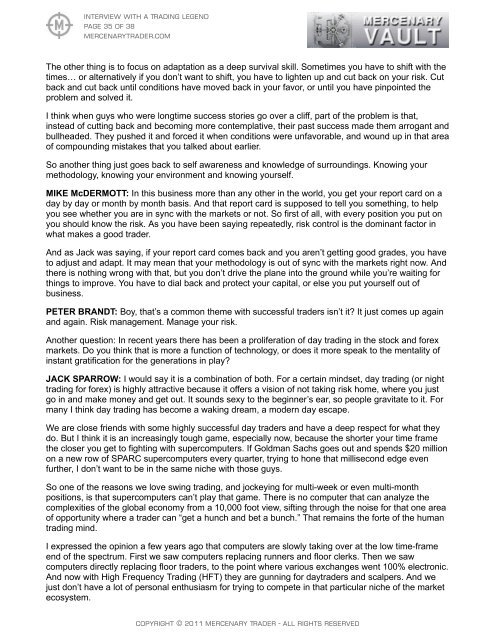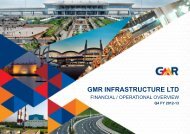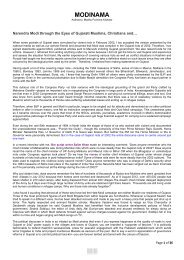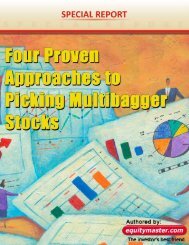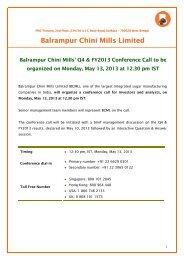Interview With a Trading Legend - Mercenary Trader
Interview With a Trading Legend - Mercenary Trader
Interview With a Trading Legend - Mercenary Trader
You also want an ePaper? Increase the reach of your titles
YUMPU automatically turns print PDFs into web optimized ePapers that Google loves.
<strong>Interview</strong> <strong>With</strong> a <strong>Trading</strong> <strong>Legend</strong><br />
Page 35 of 38<br />
mercenarytrader.com<br />
The other thing is to focus on adaptation as a deep survival skill. Sometimes you have to shift with the<br />
times… or alternatively if you don’t want to shift, you have to lighten up and cut back on your risk. Cut<br />
back and cut back until conditions have moved back in your favor, or until you have pinpointed the<br />
problem and solved it.<br />
I think when guys who were longtime success stories go over a cliff, part of the problem is that,<br />
instead of cutting back and becoming more contemplative, their past success made them arrogant and<br />
bullheaded. They pushed it and forced it when conditions were unfavorable, and wound up in that area<br />
of compounding mistakes that you talked about earlier.<br />
So another thing just goes back to self awareness and knowledge of surroundings. Knowing your<br />
methodology, knowing your environment and knowing yourself.<br />
MIKE McDERMOTT: In this business more than any other in the world, you get your report card on a<br />
day by day or month by month basis. And that report card is supposed to tell you something, to help<br />
you see whether you are in sync with the markets or not. So first of all, with every position you put on<br />
you should know the risk. As you have been saying repeatedly, risk control is the dominant factor in<br />
what makes a good trader.<br />
And as Jack was saying, if your report card comes back and you aren’t getting good grades, you have<br />
to adjust and adapt. It may mean that your methodology is out of sync with the markets right now. And<br />
there is nothing wrong with that, but you don’t drive the plane into the ground while you’re waiting for<br />
things to improve. You have to dial back and protect your capital, or else you put yourself out of<br />
business.<br />
PETER BRANDT: Boy, that’s a common theme with successful traders isn’t it? It just comes up again<br />
and again. Risk management. Manage your risk.<br />
Another question: In recent years there has been a proliferation of day trading in the stock and forex<br />
markets. Do you think that is more a function of technology, or does it more speak to the mentality of<br />
instant gratification for the generations in play?<br />
JACK SPARROW: I would say it is a combination of both. For a certain mindset, day trading (or night<br />
trading for forex) is highly attractive because it offers a vision of not taking risk home, where you just<br />
go in and make money and get out. It sounds sexy to the beginner’s ear, so people gravitate to it. For<br />
many I think day trading has become a waking dream, a modern day escape.<br />
We are close friends with some highly successful day traders and have a deep respect for what they<br />
do. But I think it is an increasingly tough game, especially now, because the shorter your time frame<br />
the closer you get to fighting with supercomputers. If Goldman Sachs goes out and spends $20 million<br />
on a new row of SPARC supercomputers every quarter, trying to hone that millisecond edge even<br />
further, I don’t want to be in the same niche with those guys.<br />
So one of the reasons we love swing trading, and jockeying for multi-week or even multi-month<br />
positions, is that supercomputers can’t play that game. There is no computer that can analyze the<br />
complexities of the global economy from a 10,000 foot view, sifting through the noise for that one area<br />
of opportunity where a trader can “get a hunch and bet a bunch.” That remains the forte of the human<br />
trading mind.<br />
I expressed the opinion a few years ago that computers are slowly taking over at the low time-frame<br />
end of the spectrum. First we saw computers replacing runners and floor clerks. Then we saw<br />
computers directly replacing floor traders, to the point where various exchanges went 100% electronic.<br />
And now with High Frequency <strong>Trading</strong> (HFT) they are gunning for daytraders and scalpers. And we<br />
just don’t have a lot of personal enthusiasm for trying to compete in that particular niche of the market<br />
ecosystem.<br />
Copyright © 2011 <strong>Mercenary</strong> <strong>Trader</strong> - All Rights Reserved


